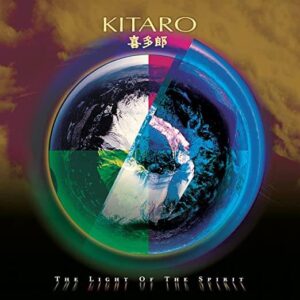 By Jae-Ha Kim
By Jae-Ha Kim
Chicago Sun-Times
October 14, 1987
(NEW YORK) Kitaro, Japan’s best-known new-age musician, said his current American tour contrasts sharply with his first trip to the United States in 1969.
“I was in San Francisco when hippies were everywhere,” said Kitaro, who was interviewed in his publicist’s office with the assistance of an interpreter. “It was quite a culture shock for me. I wasn’t used to it then. Now, I appreciate how they opened up a lot of freedom culturally and artistically.”
The Japanese composer and synthesizer player will be in Chicago to perform his lilting, serene music in a concert starting at 7:30 tonight at the Bismarck, 171 W. Randolph. Tickets ($15) are available at Ticketmaster outlets (559-1212).
Kitaro returned to San Francisco earlier this year to work on “The Light of the Spirit,” his latest album. He found the experience less jarring this time. Working with Grateful Dead drummer Mickey Hart, Kitaro has recorded his most accessible record to date.
“A lot of people have said we make a strange combination,” said Kitaro, referring to his association with Hart. “Maybe on the surface, but we got along beautifully and had a really easy time working together. He seemed to know what I was thinking, and vice versa. I’m very proud of what we’ve done.
“Normally, I work by making concentrated periods of effort in my studio in Nagano, Japan. It was an interesting method working with Mickey in San Francisco.”
In Japan, the success of his 14 albums has made him a household name. His concerts in the Far East have drawn crowds of up to 50,000. In America, his last seven albums have sold more than 1.5 million copies.
The 34-year-old synthesist said he isn’t nervous about his first North American tour because he feels comfortable in the United States, and because his backup band is comprised of six American musicians who play violin, percussion instruments and synthesizers.
“I don’t have time to worry about this series of concerts,” he said, chuckling. “The country is so big and interesting, and it’s wonderful. Plus, I look to my band for support. One thing I’ve found is that American musicians learn very quickly, so that is great.”
Born Takahashi Masanori to Buddhist-Shintoist farmers in the Toyohashi Prefecture in central Japan, Kitaro showed little interest in becoming a musician until his senior year in high school. He taught himself how to play the electric guitar by listening to records. He didn’t care for the American and European pop music that was popular in his country, he said. But he liked Otis Redding and other rhythm-and-blues artists.
He formed his first band, Albatross, as a high school student. Not content to merely write the group’s music, he also wrote poetry to fit into the songs.
“My early upbringing on the farm definitely made an impact on me as a man and as a musician,” he said. “I always, even as a child, wrote about where man fit into the scheme of things, his relationships with nature. That’s what I liked about (Redding’s `Dock of the Bay’). It was such a simple, elegant song that made you feel what he was singing. I try to do that, too, with my music.”
After school, he joined a group called the Far East Family Band and recorded two albums with the group. By that time, he had switched from the guitar to playing a synthesizer. He said he noticed the power of the synthesizer when he began rebuilding store-bought ones to suit his own needs.
“It was amazing to hear all these different things that were created by my changing a little thing here and there,” he said. “It may sound difficult – tampering with an instrument – but it is such a creative procedure and really fulfilling to a musician, I think.”
In 1972, Kitaro went to Europe and met Klaus Schulze, of pioneer electronic group Tangerine Dream.
“After that I knew I had a long way to go before fulfilling my potential,” he said. “I was fascinated. I wanted to know more. He taught me what he knew, for which I will always be grateful. I think it was around then that I made a really concerted effort to work on my own music and stopped listening to and being as influenced by other
people’s music.”
Kitaro said he doesn’t want people to assume only “arty” people can enjoy new-age music. He said it’s a type of music everyone can relate to because the themes aren’t as secular as many of the songs written for the pop charts.
“Music brings joy to people,” he said. “That’s all I hope to accomplish with this tour, really.”
When he decided to go by a different stage name early in his career, he said he took into consideration the meaning of his new name. Made up of three Japanese characters, Kitaro means man of many joys.
When he finishes his tour, Kitaro will return to his 200-year-old farmhouse, where he lives with his wife and 3-year-old son. He said he would like to travel to Egypt, Africa and South America.